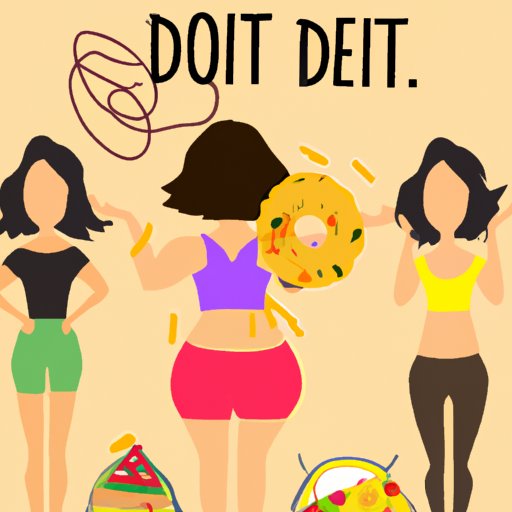Introduction
Diet culture is a set of beliefs and behaviors that are centered around the idea that thinness equates to health and morality. It is a system of beliefs that values weight loss and restriction above all else and creates a hierarchy of bodies based on their size. Diet culture is pervasive in our society, influencing everything from our food choices to our self-worth. While it has been around for centuries, diet culture has become increasingly entrenched in our everyday lives in recent years. This article will explore what diet culture is, its impact, and how to avoid getting caught up in it.
Exploring the Impact of Diet Culture on Mental Health
The impact of diet culture on mental health can be profound. Studies have shown that engaging in restrictive eating or dieting behaviors can lead to a number of negative emotional consequences, such as feelings of guilt, shame, anxiety, and depression. These feelings can be further compounded by the fact that diet culture often sets unrealistic expectations for weight loss and body shape that are difficult, if not impossible, to achieve. This can lead to feelings of failure and inadequacy, which can be damaging to one’s self-esteem and overall mental wellbeing.

The Role of Body Image in Diet Culture
Body image is an important component of diet culture. Diet culture perpetuates the idea that certain body types are more desirable than others, creating a hierarchy of bodies based on size. This can lead to people feeling like they need to conform to certain beauty standards in order to be accepted and valued. Unfortunately, this can have a detrimental effect on people’s self-perception, leading to feelings of insecurity and low self-esteem.
The Dangers of Diet Culture: How to Avoid Getting Caught Up in It
Engaging in diet culture can be dangerous and can lead to serious physical and mental health issues. Therefore, it is important to recognize the signs of unhealthy habits or behaviors related to diet culture and take steps to avoid getting caught up in it. One way to do this is to recognize your triggers and understand why you feel the need to engage in diet culture behaviors. For example, if you find yourself turning to restrictive eating or dieting in response to stress or low self-esteem, try to find healthier coping mechanisms.
How Diet Culture Has Changed Over Time
Diet culture has evolved over time and taken on different forms. Historically, diet culture was primarily focused on women, with an emphasis on maintaining a slender figure. However, in recent years it has become increasingly prevalent in men as well, with an emphasis on muscle building and toned physiques. Additionally, diet culture has become increasingly commercialized and monetized, with many companies now offering products and services designed to help people “lose weight fast.”
Unpacking the Myths Behind Diet Culture
One of the most insidious aspects of diet culture is the false promises it makes. Despite its claims to provide quick and easy results, studies have shown that most diets fail in the long term. Furthermore, research has indicated that restrictive eating and dieting can actually lead to weight gain over time. Therefore, it is important to recognize the myths behind diet culture and understand that it is not a sustainable or healthy approach to weight loss.

How to Develop a Healthy Relationship with Food Despite Diet Culture
Despite the prevalence of diet culture, it is possible to develop a healthy relationship with food. The key is to establish healthy eating habits that focus on nourishing your body rather than restricting it. This means listening to your body’s hunger cues and learning to trust your own internal signals rather than relying on external sources of information. Additionally, it is important to recognize that food is fuel and that nourishing your body is the best way to ensure optimal health and wellbeing.

Examining the Social and Cultural Influences of Diet Culture
It is important to recognize that diet culture is not just an individual problem, but a societal one. Social media and popular culture play a significant role in perpetuating diet culture and its associated ideals. Social media platforms like Instagram and TikTok have become hotbeds of diet culture, with influencers touting the latest fad diets and supplements. Popular culture has also embraced diet culture, with movies and TV shows featuring characters who embody the “ideal” body type.

Exploring the Role of Media in Promoting Diet Culture
In addition to social and popular culture, media also plays a significant role in promoting diet culture. Advertising strategies used by companies in the diet industry often target vulnerable populations, such as adolescents and those with existing mental health issues. Furthermore, media often portrays diet culture as a “quick fix” for weight loss, neglecting to mention the potential dangers and risks associated with it. It is important to recognize these tactics and be aware of how media is portraying diet culture.
Conclusion
Diet culture is a pervasive system of beliefs and behaviors that values thinness and restriction above all else. It can have a significant impact on mental health, leading to feelings of guilt, shame, anxiety, and depression. Furthermore, diet culture can lead to unhealthy habits and behaviors that can be dangerous. It is important to recognize the myths behind diet culture and understand how to develop a healthy relationship with food. Additionally, it is essential to recognize the role of social, popular, and media culture in promoting diet culture and how to avoid getting caught up in it. For further reading on this topic, please see the list of suggested resources below.
(Note: Is this article not meeting your expectations? Do you have knowledge or insights to share? Unlock new opportunities and expand your reach by joining our authors team. Click Registration to join us and share your expertise with our readers.)
